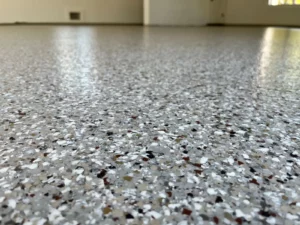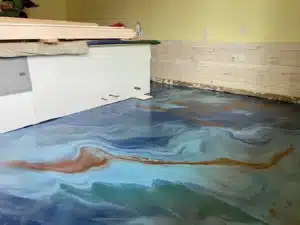Introduction
When looking for durable, cost-effective, and attractive flooring options, epoxy floors stand out, especially for environmentally-conscious architects and builders. These floors are known for their toughness, ease of maintenance, and a wide range of aesthetic choices that can complement any design vision. Moreover, they offer an eco-friendly alternative with less frequent replacements and minimal impact on the environment.
Epoxy flooring is an outstanding choice for both commercial and residential spaces due to its resilience against spills, heavy wear, and stains. This guide will walk you through the basics of epoxy flooring and highlight its major advantages, making it easier for you to understand why it might be the perfect choice for your next sustainable building project.
Epoxy Basics and Advantages:
– Durability: Epoxy floors withstand heavy use and abuse, making them ideal for garages, commercial kitchens, and other high-traffic areas.
– Ease of Maintenance: Cleaning these floors is a breeze, requiring only a sweep and occasional mopping with gentle cleaners.
– Aesthetic Flexibility: With a vast palette of colors and patterns, epoxy can achieve looks ranging from sophisticated metallic finishes to vibrant solid colors.
– Eco-Friendly: Their long lifespan means fewer replacements and less waste, aligning well with sustainable building practices.
Whether you’re exploring flooring options for a new construction project or considering updating an existing space, keep reading to discover how epoxy floors can meet your environmental and aesthetic goals.

Understanding Epoxy Floors
When we dive into epoxy floors, three standout features make them a popular choice for both commercial and residential spaces: Durability, Water Resistance, and Aesthetic Appeal. Let’s break these down in simple terms.
Durability
Imagine a floor that can take on heavy traffic, resist scratches, and not flinch at spills or stains. That’s what epoxy flooring offers. It’s like a superhero for your floor – tough against daily challenges. Whether it’s a busy kitchen, a high-traffic retail space, or your home garage, epoxy floors stand the test of time. They’re built to last, making them a cost-effective solution in the long run. No wonder they’re a go-to choice for areas that see a lot of action!
Water Resistance
Water can be a headache for many types of flooring, leading to damage, mold, and mildew. But not with epoxy floors. They create a seamless and impervious barrier, meaning spills, moisture, and even flooding don’t stand a chance. This water resistance makes epoxy floors ideal for spaces like bathrooms, kitchens, and basements where moisture is often part of the equation. It’s peace of mind in the form of flooring.
Aesthetic Appeal
Now, let’s talk looks. Epoxy floors are not just about toughness; they’re also about style. With a variety of colors, patterns, and finishes available, they offer endless possibilities to match any decor. From a sleek, high-gloss finish that makes a room pop to a subtle matte look that exudes sophistication, epoxy flooring can be customized to your heart’s desire. It’s a way to make a statement, whether you’re aiming for a modern vibe or a classic look.
In a nutshell, epoxy floors combine durability, water resistance, and aesthetic flexibility in a way few other flooring options can. They’re a practical yet stylish choice that can suit a wide range of needs and preferences. As we move into the next sections, we’ll explore more about the pros and cons of epoxy flooring, how they compare to other flooring choices, and what it takes to install and maintain them. Stay tuned for a deeper dive into epoxy floors..
While these disadvantages are worth considering, they don’t necessarily outweigh the many benefits of epoxy flooring. It’s all about understanding your specific needs and what you value most in a flooring option. In the next section, we’ll compare epoxy flooring to other options on the market, helping you make the most informed decision for your space.

Comparing Epoxy to Other Flooring Options
When choosing the right flooring, it’s important to weigh all your options. Epoxy floors, with their sleek appearance and durability, offer a unique set of benefits. But how do they stack up against other flooring choices like tile, hardwood, or vinyl? Let’s dive into the cost comparison, installation ease, and longevity to help you decide.
Cost Comparison
Epoxy Floors: Initially, epoxy might seem pricier than some alternatives. However, considering its durability and minimal maintenance needs, it often proves to be cost-effective in the long run.
Tile: While tile can offer a similar durability level, the upfront costs, including materials and labor, can be high. Plus, broken tiles and grout maintenance add to the long-term expenses.
Hardwood: Hardwood floors offer a timeless look but come with a high price tag for both installation and upkeep. They’re also prone to scratches and water damage.
Vinyl: Vinyl flooring is an affordable upfront option and comes in various designs. However, it doesn’t match epoxy’s longevity and can suffer from wear and tear more quickly.
Installation Ease
Epoxy Floors: The key to a successful epoxy floor is proper surface preparation, which can be labor-intensive. However, once the surface is ready, the application process is straightforward.
Tile: Tile installation requires skill, especially to ensure that the tiles are laid evenly and the grout lines are perfect. It’s usually not a DIY-friendly option.
Hardwood: Installing hardwood floors demands a high level of precision, making it a job best left to professionals.
Vinyl: Vinyl is the most DIY-friendly among these options. It’s easy to cut and lay down, making it a popular choice for those looking to save on labor costs.
Longevity
Epoxy Floors: With proper installation and maintenance, epoxy floors can last from 10 to 20 years or more, even in high-traffic areas.
Tile: Tile floors can last a lifetime if taken care of properly, but they’re prone to cracking and the grout can become discolored over time.
Hardwood: Hardwood can last for decades but requires regular maintenance, including refinishing, to keep it looking its best.
Vinyl: Vinyl flooring typically has a shorter lifespan, ranging from 5 to 15 years, depending on the quality and amount of foot traffic.
In conclusion, when comparing epoxy to other flooring options, consider not just the initial cost and installation ease but also the long-term value and lifespan. Epoxy floors stand out for their durability, low maintenance, and overall longevity, making them a wise investment for both residential and commercial spaces. We’ll delve into the specifics of installing and maintaining epoxy floors to ensure you get the most out of your flooring choice.
Installation and Maintenance of Epoxy Floors
Epoxy floors are a popular choice for those seeking durability and aesthetic appeal in their flooring. However, the key to their longevity lies in proper installation and maintenance. Let’s break down the process and provide some tips to keep your floors looking great.
Surface Preparation
The First Step is all about preparing the surface. This is crucial because how well the epoxy adheres to the floor depends on it. The concrete must be clean, dry, and free from any previous coatings, oil, or grease. Professionals often use industrial-grade equipment to clean and sometimes grind the concrete to create a rough texture. This texture is essential as it helps the epoxy coating to stick better, ensuring a long-lasting finish.
Application Process
Mixing Epoxy is where science meets art. You have to mix the epoxy resin with a hardener at the precise ratio recommended by the manufacturer. This triggers a chemical reaction necessary for the epoxy to cure and harden properly. It’s a delicate balance – too much or too little of one component can affect the durability and finish of the flooring.
Applying the Coatings requires skill and attention to detail. Specialists use specific tools to spread the epoxy evenly across the surface. The goal is a smooth, flawless finish without bubbles or uneven spots.
Maintenance Tips
Daily Maintenance is straightforward. Sweep regularly to remove dirt and grit that can accumulate. For tougher dirt, vacuum with a soft brush attachment. This prevents scratches that could dull the epoxy’s shine over time.
Spot Cleaning is essential for spills. Clean them up immediately with warm water. Avoid soap-based cleaners as they can leave a hazy buildup. For heavy soil, warm water and a hard foam mop work well, followed by an ammonia/water mix if necessary.
Addressing Stains and Chemical Spills should be done promptly with appropriate cleaners and tools. Epoxy is resistant to most chemicals, but certain substances can damage the surface if left unattended.
Remember: Epoxy floors are not just about the initial installation but also about ongoing care. Regular maintenance ensures your floors stay looking as good as new and last for years to come.
By understanding and following these steps for installation and maintenance, you can ensure your epoxy floors remain durable, beautiful, and a valuable addition to your space. As we explore further into the customization options available for your home, keep in mind the importance of these foundational aspects.

Frequently Asked Questions about Epoxy Floors
When it comes to choosing the right flooring, many homeowners and business owners have questions about epoxy floors. Let’s dive into some of the most common queries.
Is Epoxy Flooring a Good Idea?
Durability and Longevity are key factors that make epoxy flooring a standout choice. Epoxy floors are known for their strength and resistance to wear and tear, making them ideal for high-traffic areas. They can withstand heavy loads, chemicals, and spills, ensuring they last for years without significant damage.
Is Epoxy Floor Cheaper Than Tile?
When we talk about Cost Analysis and Installation Costs, epoxy flooring often comes out as a more cost-effective option in the long run compared to tile. Initially, the cost of epoxy might seem higher, but considering its durability and low maintenance requirements, it can be more economical over time. Tiles, while beautiful, can crack and require grout maintenance, adding to their lifetime cost. Epoxy, on the other hand, creates a seamless and durable surface that can save you money on repairs and replacements.
How Long Do Epoxy Floors Last?
The Lifespan of epoxy floors is impressive, with properly installed and maintained floors lasting 10 to 20 years. The key to achieving this longevity is Maintenance. Regular cleaning and the avoidance of harsh chemicals can significantly extend the life of your epoxy flooring. While epoxy floors are robust, they still need care to maintain their appearance and functionality over the years.
In summary, epoxy floors are a durable, cost-effective, and long-lasting flooring option that can withstand the demands of high-traffic areas. Their maintenance is straightforward, requiring regular cleaning to keep them looking their best. With proper installation and care, your epoxy floor can be a beautiful and practical investment for your home or business. Consider how the sustainable design and expert installation services from Topcoat Services can enhance the value and appeal of your space.
Conclusion
In wrapping up our journey through epoxy floors, circle back to the principles of sustainable design and the unmatched expertise that Topcoat Services brings to the table.
Sustainable Design
Epoxy floors stand out not just for their durability and aesthetic appeal but also for their eco-friendly nature. These floors are designed to last, significantly reducing the need for frequent replacements and, in turn, cutting down on waste. Their resilience means you’ll use fewer harsh chemicals for cleaning, aligning perfectly with a greener, more sustainable lifestyle.
Choosing an epoxy floor is a step towards a future where we prioritize not only our needs but the planet’s health too. It’s a smart choice for anyone looking to embrace green building practices while not compromising on style or durability.
Topcoat Services
At Topcoat Services, we’re not just service providers; we’re your partners in bringing your vision to life. Our expertise in epoxy flooring is unmatched, ensuring that every project we undertake is tailored to meet your specific needs. Whether it’s a commercial space that sees heavy foot traffic or a cozy corner in your home, we guide you through the selection process, ensuring your floor reflects your style and withstands the test of time.
Our commitment to sustainable design is evident in every project we undertake. By choosing us, you’re not just getting a floor; you’re making a statement about your commitment to sustainability and quality. Let us help you transform your space with an epoxy floor coating that meets all your needs—durability, style, and environmental stewardship.
In conclusion, the journey to selecting the right flooring for your space is significant. By focusing on sustainable design and partnering with Topcoat Services, you’re choosing a path that leads to a beautiful, durable floor that aligns with your values and aesthetic preferences. Embrace the future of flooring with confidence, knowing that you’ve made a choice that benefits not only your space but the planet as well.









